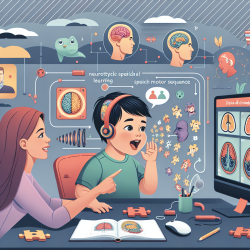Introduction
In the realm of pediatric healthcare, managing pain in children and adolescents presents a unique set of challenges. The complex nature of pediatric pain requires a comprehensive approach that encompasses pharmacological, physical, and psychological strategies. However, gaps in education and training for healthcare providers (HCPs) often hinder effective pain management. The recent study titled "Pediatric Project ECHO® for Pain: Implementation and Mixed Methods Evaluation of a Virtual Medical Education Program to Support Interprofessional Pain Management in Children and Youth" sheds light on an innovative approach to bridging these gaps through virtual education.
Project ECHO®: A Model for Interprofessional Education
Project ECHO® (Extension for Community Healthcare Outcomes) is a pioneering model designed to deliver specialized healthcare education and mentorship through a virtual platform. This model has been effectively adapted to address various clinical conditions, including chronic pain management. The study in question explores the implementation of Project ECHO® specifically for pediatric pain management, aiming to enhance the knowledge and self-efficacy of HCPs across different settings.
Key Findings from the Study
- Feasibility and Acceptability: The study demonstrated that implementing Project ECHO® for pediatric pain management is feasible and well-received among participants. With over 85 TeleECHO sessions conducted, the program achieved high acceptability scores, indicating its effectiveness as a learning platform.
- Improvement in Knowledge and Self-Efficacy: Participants reported significant improvements in their knowledge and self-efficacy regarding pediatric pain management. The program effectively enhanced their understanding of assessment techniques, pharmacotherapy, and psychological interventions.
- Positive Impact on Clinical Practice: The program's impact extended beyond education, positively influencing clinical practice. Participants noted improved satisfaction in managing pediatric pain cases and reported changes in care plans based on the knowledge gained through the program.
- Adaptation During COVID-19: The study highlighted the adaptability of the ECHO® model during the COVID-19 pandemic. It facilitated continued education and engagement among HCPs, demonstrating the model's resilience in the face of public health emergencies.
Implications for Practitioners
The insights gained from this study offer valuable implications for practitioners seeking to enhance their skills in pediatric pain management:
- Engage in Virtual Learning: Practitioners are encouraged to participate in virtual education programs like Project ECHO® to stay updated on the latest pain management techniques and collaborate with peers across disciplines.
- Adopt a Multimodal Approach: Incorporating a comprehensive "3-Ps" approach—pharmacological, physical, and psychological strategies—can lead to more effective pain management outcomes for pediatric patients.
- Leverage Technology for Education: The success of Project ECHO® underscores the potential of technology-enabled education to bridge knowledge gaps and foster a community of practice among HCPs.
Conclusion
The Pediatric Project ECHO® for Pain study provides compelling evidence for the effectiveness of virtual education in enhancing pediatric pain management. By engaging in such programs, practitioners can improve their knowledge, self-efficacy, and ultimately, the quality of care provided to children and adolescents experiencing pain. As the healthcare landscape continues to evolve, embracing innovative educational models like Project ECHO® will be crucial in addressing the complex challenges of pediatric pain management.
To read the original research paper, please follow this link: Pediatric Project ECHO® for Pain: implementation and mixed methods evaluation of a virtual medical education program to support interprofessional pain management in children and youth.










